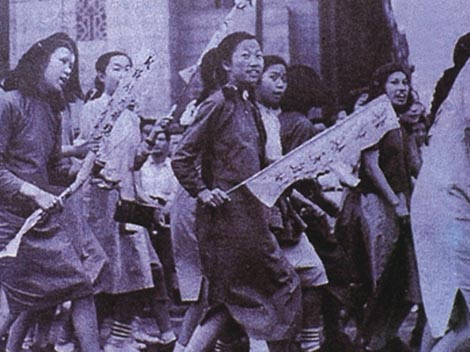 |
Peoples' movements and protests |
 |
|
Mobilizations19th century women's movementsThe early 20th century workers' movementsChina's women's movementLate 20th century feminismBack to Women's movementsBack to main page |
The Chinese women's movement in the 1920s
The Chinese women’s movement 1919-1928 is perhaps the most short-term successful women’s movement ever. It was a spin-off of the May 4 movement – a student movement aimed at Japanese demands to use China as a colony but at the same time a reaction against Chinese backwardness and Confucian hierarchies. It was mainly inspired by Western radicalism, but one can assume that there was a lot of inspiration from the egalitarian traditions of the Chinese secret societies as well. From the beginning, the women’s movement was mostly about education – so that young women would not have to get married off in order to be supported. It became a mass movement in connection with the shelling of a seamstress strike in Shanghai. From about 1925, this movement participated in the attempts to organize a strong Chinese regime in the south. The women activists traveled around and stopped the forced marriage and organized the education of women. The ”Northern Expedition”, this regime’s takeover of power in the Yangtze Valley, also expanded the women’s movement and radicalized it – it became a ministry of the new regime, with the power to dissolve unwanted marriages and ban concubinage. This provoked the macho power and helped to provoke the military coup in 1928. As far as state power was concerned, the movement was wiped out, and in the peasant republics dominated by the communists, its power was severely limited. However, the goals of the women’s movement were also part of the peasant movement / national movement in the future, and in the People’s Republic the power of patriarchy has diminished significantly. Reading
|
